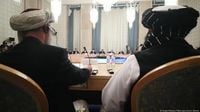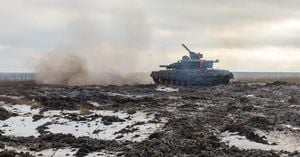In a significant shift in foreign policy, the Supreme Court of the Russian Federation has "temporarily" lifted the ban on the Taliban, a move that signals a new chapter in Russia's relationship with Afghanistan's ruling authority. This decision, announced on April 17, 2025, comes in response to a request from the office of the prosecutor general and follows a decree issued by President Vladimir Putin in 2024 that paved the way for the Taliban's removal from Russia's list of terrorist organizations.
The Taliban, which regained power in Kabul in August 2021 following the withdrawal of international coalition forces, has long been viewed with suspicion by many nations. However, Russia's recent actions indicate a desire to normalize relations with the group, which has been described by Putin as "allies in the fight against terrorism." This marks a stark contrast to the Kremlin's previous stance, which labeled the Taliban as a terrorist organization since 2003.
According to Russian law, any member of the Taliban entering the country could face up to 20 years in prison. Yet, since 2016, no Taliban member has been detained upon entering Russia, a clear sign that unofficial negotiations were underway. Taliban representatives have made multiple visits to Moscow and St. Petersburg over the years, attending significant events such as the International Economic Forum.
Judge Oleg Nefedov of the Supreme Court announced that the previously established ban on Taliban activities has been suspended, allowing for potential economic collaborations without the threat of legal repercussions. The decision does not equate to formal recognition of the Taliban as Afghanistan's legitimate government but helps Russian officials avoid embarrassment in high-profile meetings with Taliban representatives.
The Taliban's rise to power has forced Russia to reconsider its position in the region. Historically, the Taliban supported Chechen fighters during the second Chechen War from 1999 to 2009, which complicated Russia's relationship with the group. However, with the U.S. withdrawal from Afghanistan, the Kremlin has sought to portray the Taliban's takeover as a failure of American foreign policy.
In a broader context, the Taliban's efforts to gain international legitimacy have seen some success. Countries such as Kazakhstan and Kyrgyzstan have removed the Taliban from their national lists of terrorist organizations, while China has accepted a Taliban-appointed ambassador. Despite these gestures, no country has yet formally recognized the Taliban government.
Evgeniy Smirnov, from the independent human rights group Pervyi Otdel, noted that the Supreme Court's ruling effectively removes the Taliban from the terrorism list, allowing for legal collaboration without criminal consequences. However, he emphasized that existing convictions related to the Taliban cannot be overturned.
Political analyst Ruslan Suleymanov highlighted that the Taliban is still facing international skepticism due to the repressive laws reinstated since their return to power, particularly regarding women's rights. He pointed out that while the Taliban has made strides toward establishing diplomatic ties, the international community remains cautious, especially given the group's past actions.
Since the Taliban's return, Russia has been keen on fostering economic ties, viewing Afghanistan as a potential transit hub for energy resources heading to Southeast Asia. In July 2024, Putin's characterization of the Taliban as allies reflects a pragmatic approach to countering the influence of the Islamic State-Khorasan (IS-K), an extremist group responsible for numerous attacks in both Afghanistan and Russia.
The recent Supreme Court ruling and the ongoing diplomatic engagements underscore a significant pivot in Russia's strategy toward Afghanistan. As the Taliban seeks to end its international isolation, Russia appears ready to engage more deeply, potentially reshaping the geopolitical landscape in Central Asia.
While the Taliban's designation as a terrorist organization has been lifted, the road to formal recognition remains fraught with challenges. The international community continues to watch closely as Russia navigates its relationship with the Taliban amidst a backdrop of shifting alliances and regional dynamics.




